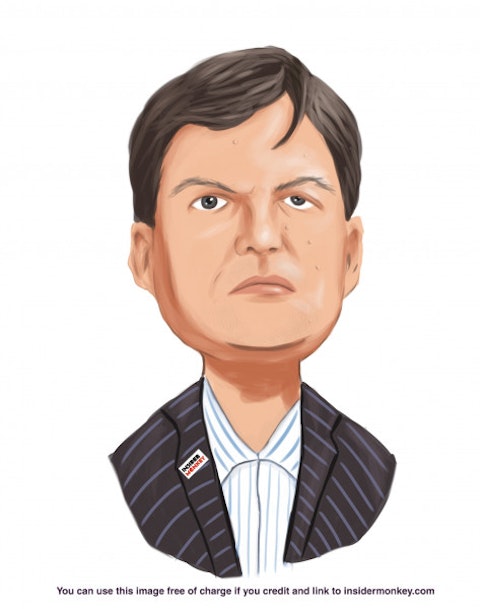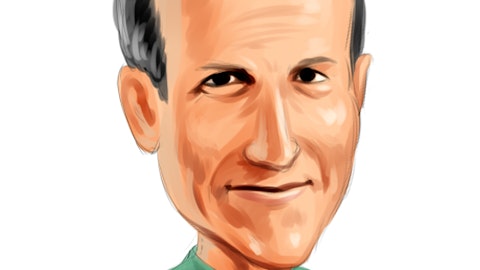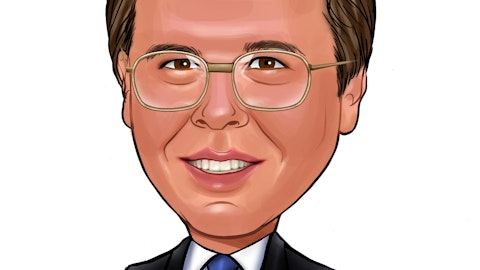Michael Burry is a well-known value investor and the founder of Scion Asset Management. Scion Asset Management had more than $100 in AUM in 2016 and started filing 13Fs. Unfortunately, its AUM must have declined below the $100 million reporting threshold as the fund stopped disclosing its 13F holdings in 2017. Recently he started filing 13Fs again. In the latest 13F filing Burry revealed a portfolio of stocks valued at $93 million. Here is some background information on Michael Burry from Insider Monkey (you can see his latest holdings on the same page):
Despite being one of the few prominent investors in the world to recognize the bubble brewing in the subprime mortgage markets and the crisis it would lead to when it burst, Michael Burry received only limited recognition for his talent until renowned writer Michael Lewis of ‘Moneyball’ fame wrote about Mr. Burry’s journey in the 2010 bestseller ‘The Big Short: Inside the Doomsday Machine’. That recognition has turned into even greater fame more recently after the release of the movie by the same name, in which Mr. Burry is played by star actor Christian Bale. As the ending of the movie showed, even after making outsized gains during the financial crisis, Mr. Burry soon closed his hedge fund, Scion Capital LLC, due to the continuous redemption pressure he faced from his investors while betting against the housing market. However, what the movie didn’t show was that Mr. Burry has been back in the game since 2013. He started another hedge fund, Scion Asset Management, LLC, later that year and although he has been predominately investing in water, his fund recently revealed a fairly large U.S equity portfolio, submitting its first 13F filing with SEC, for the reporting period ending December 31.
Let’s take a closer look at what Michael Burry is doing recently. Michael Burry’s biggest positions are in troubled companies such as Western Digital, Cleveland Cliffs, Cardinal Health, and Tailored Brands Inc (NYSE:TLRD). Though we have to tell you that Michael Burry is also invested in a few extremely popular stocks among hedge funds such as Alphabet Inc (NASDAQ:GOOG), Alibaba Group Inc. (NYSE:BABA), and Disney (NYSE:DIS). All of these stocks are among the 10 most popular stocks list.

Michael Burry of Scion Asset Management
At the end of last week Michael Burry filed a 13D with SEC reiterating his activist plans regarding Tailored Brands. Michael Burry spent more than $20 million for 2.6 million shares of TLRD. This means his average cost is $7.75 while TLRD shares closed at $5.42 on Friday. Here is what he said in a letter to the board:
“Scion Asset Management and its affiliates (“Scion”) are shareholders of Tailored Brands, Inc. (“Tailored”). Scion currently owns approximately 2,600,000 shares, or about 5.15%, of the 50,519,133 common shares outstanding per Bloomberg.
On August 21st, Street Insider cited an anonymous source in reporting that Tailored has been approached several times by Sycamore Partners about an acquisition, and that Tailored had “engaged bankers at Bank of America/Merrill Lynch to evaluate the offer and other options.” The same article reported “the latest offer valued the company at around $10 per share.” We do not know if any of this is true. However, we believe you must know that $10 per share is not fair value and will not be acceptable to shareholders.It was just last December that CFO Jack Calandra purchased 7,500 shares at $13.43 per share. Two other executives have purchased shares in the open market since then. And in 2014, three members of the current Board of Directors oversaw the issuance of existentially threatening levels of debt to finance the acquisition of Joseph A. Banks at $1.825 billion.So it is that we believe the Board, CFO and other executives are very aware of both the substantial value of Tailored Brands and the resilience of its core business. We do not believe the technical factors and the misunderstanding contributing to the market’s current evaluation of retailers and Tailored in particular should determine the ultimate value realized by shareholders.With some urgency, we stand by our letters of August 2nd and 19th. Given the quarter-century lows in the common stock and the severe undervaluation this entails, we believe the best use of funds from the corporate apparel segment sale, in good part or in full, is for a share repurchase.While management is considering asset sales, we would encourage exploring the market for Tailored’s Canadian operations. The Board and management ought to focus resources on its core 1300+ store U.S. operations. Proceeds from a sale of these remaining international operations may also be best used to accelerate debt repayment and stock buybacks.”Michael Burry recently talked to Bloomberg about passive investing. According to the article Burry currently has $343 million in AUM and investing in small-cap companies in US and Korea. Burry sees a bubble in passive investing at the moment.
“Scion Asset Management, LLC and its affiliates (“Scion”) own approximately 2,750,000 shares, or about 3.05%, of GameStop, Inc. (“GameStop”) common stock.As mentioned in our previous letter to the board, we have concerns regarding capital management at GameStop. Given recent GameStop common stock prices under $4 per share, we must re-state that GameStop complete the remaining $237,600,000 share repurchase at once and with urgency.
Given the market capitalization of GameStop at $290 million at the close on August 15th, completing the authorization would retire over 80% of GameStop’s outstanding shares. Depending on the timing and quality of execution, such a repurchase would increase earnings per share dramatically – far more than any other possible action on a per share basis.
The numbers are striking and demand action. We estimate that GameStop now has in excess of $480 million of cash, more than enough to complete the share repurchase authorization and still invest in the business and pay down debt.
Through August 15th, a total of 11 trading days, 50,399,534 shares have traded. At this rate, for the month of August and for the third month in a row, the number of shares traded will exceed the total number of shares outstanding. Because of such high volume, we maintain that GameStop could pull off perhaps the most consequential and shareholder-friendly buyback in stock market history with elegance and stealth.
Shareholders staring at all-time lows in GameStop stock see little evidence that GameStop has effectively leveraged its elite position in the gaming universe as the new paradigm came into clear view over the last five years.
The unfortunate reality is that Amazon, not GameStop, bought Twitch in 2014. Instead, in 2014, GameStop started buying wireless store assets. And in 2017, Amazon, not GameStop, bought GameSparks – while less than a year ago GameStop reversed course and sold its wireless store assets. Shareholders are right to worry.
We expect GameStop’s business will perk up a bit during 2020 and 2021 as the new console cycle, with associated software updates and introductions, finally gets underway. But what is happening now in the stock is about more than late cycle doldrums or even the streaming paradigm – shareholders do not have faith in current management, and have not been inspired by new leadership policies.
Notably, as of July 31st, 2019, Bloomberg reports short interest in GameStop stock at 57,226,706 shares – this is about 63% of the 90,268,940 outstanding GameStop shares at last report.
We submit that when share prices are at or near all-time lows and more than 60% of the shares are shorted despite cash levels much higher than the current market capitalization, lack of faith in management’s capital allocation is the default conclusion.
All of this creates the opportunity to enter 2020 with a dramatically reduced share count along with multi-fold greater impact per share for every single other achievement of management. Consider as just one example that if the turnaround is successful, and if GameStop were able to shrink its shares outstanding to 30 million through the share repurchase, the $157 million dividend that was just eliminated would pay out around $5.25 per share.
The Board deemed up to $6.00 per share a good price for a buyback less than two months ago, and the price of the stock today is nearly half that amount.
We again advise the Board to represent shareholders well, and to ensure the execution of the remaining repurchase authorization in full.”
We will be closely watching the performance of these stocks as well as the Michael Burry’s performance in the coming weeks.
Disclosure: None. This article is originally published at Insider Monkey.





